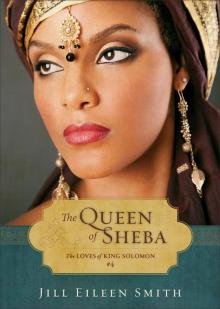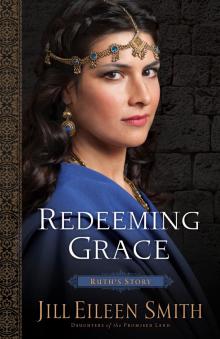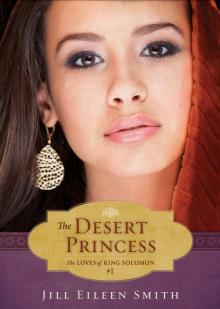- Home
- Jill Eileen Smith
The Desert Princess
The Desert Princess Read online
© 2014 by Jill Eileen Smith
Published by Revell
a division of Baker Publishing Group
P.O. Box 6287, Grand Rapids, MI 49516-6287
www.revellbooks.com
All rights reserved. No part of this publication may be reproduced, stored in a retrieval system, or transmitted in any form or by any means—for example, electronic, photocopy, recording—without the prior written permission of the publisher. The only exception is brief quotations in printed reviews.
ISBN 978-1-4412-4507-2
Scripture quotations are from the Holy Bible, New International Version®. NIV®. Copyright © 1973, 1978, 1984, 2011 by Biblica, Inc.™ Used by permission of Zondervan. All rights reserved worldwide. www.zondervan.com
This is a work of historical reconstruction; the appearance of certain historical figures is therefore inevitable. All other characters, however, are products of the author’s imagination, and any resemblance to actual persons, living or dead, is coincidental.
Published in association with the Books & Such Literary Agency, Wendy Lawton, Central Valley Office, P.O. Box 1227, Hilmar, CA 95324, [email protected]
To Kathy Fuller, dear friend and critique partner. Thank you for going over this with your fine-tooth comb—er, colorful tracked changes—and making such insightful suggestions. You caused me to dig deeper, and I know the story is better for it.
Most of all, thank you for your friendship. You are a treasure.
Rehoboam son of Solomon was king in Judah. He was forty-one years old when he became king, and he reigned seventeen years in Jerusalem, the city the LORD had chosen out of all the tribes of Israel in which to put his Name. His mother’s name was Naamah; she was an Ammonite.
1 Kings 14:21
Contents
Cover
Title Page
Copyright Page
Dedication
Epigraph
Prelude
1
2
3
Interlude
4
5
6
7
8
9
10
11
12
Postlude
Note to the Reader
Acknowledgments
About the Author
Books by Jill Eileen Smith
Back Ads
Back Cover
Prelude
If history is true, it will tell a kinder story of my husband than I have heard during these final years, when the gossips and jealous women of his harem did all in their power to ruin him with their gods. How could a man deemed once so wise stoop to such lows?
Solomon was a fool.
And yet . . . I cannot deny the power his wisdom had over me. His words were jewels, shining like the gold of Ophir he favored. Nations flocked to hear him speak, and none could stand above him.
Solomon’s God loved him.
And so did I in my starry-eyed youth. Ah, the dreams of a spoiled young princess . . .
1
RABBAH, 980 BC
A claw-like hand rose from the dark and curled around my throat. Sharp nails dug into my neck, squeezing the air from my lungs, while the beat of heavy drums and the popping sounds of short trumpet blasts filled my ears. I fought the intruder, slapping and flailing, until my heart nearly burst from my chest.
“Naamah! Wake up, child!” The gentle touch on my shoulder startled me, and I drew in great gulps of air, blinking awake. The thick blankets and soft sheets meant to soothe me lay in a tangled heap from my waist to my ankles.
“It’s all right, child,” Inaya said. My nurse’s fingers now cooled the heat of my face. “It is not the drums you hear. It is only the sound of one pounding on the door below.”
Not the drums of Molech. I willed my pulse to slow. I tilted my head, straining to listen. The incessant knocking grew louder. I kicked aside the tangled bedcovers.
“Who would come calling at such a time?” I met Inaya’s worried look. “Something bad must have happened.”
Inaya held me back with a sturdy hand. “Let me send a guard to check. If there is danger, you must stay away from it.”
Inaya waited a moment until she had secured my silent nod of acceptance. My heart still raced within me, and my stomach fluttered like the flapping of birds’ wings. Had there been an invasion? I crept closer to the door and peered around Inaya’s legs as she spoke to the guard. Shouts came from the direction of the front door, and I heard the sounds of rushing feet on the stairs and through the great house’s halls.
“A messenger has come from King David,” the guard said to Inaya. “There is trouble.”
“What kind of trouble?” Inaya glanced at me, bidding me to stay with a stern look, then walked with the guard out of my hearing. She would weed out every detail the servants could tell her and give me only part of the tale when she knew I wanted to know all. “It is not seemly for a ten-year-old girl to have so much knowledge,” she would tell me when I pleaded with her. So I had reverted to sneaking into my father’s chambers and listening from behind the heavy draperies.
Abba pretended he did not see me, often indulging me. But most of the time he was too preoccupied to notice my hiding place. Inaya suspected my antics, and she worried over my father’s indulgences, fearing I would grow up too quickly or become just another spoiled princess like my cousins. Even then I knew she was wrong. I had already seen too much loss in my short years on earth to make me as pompous and frivolous as Junah and Fayha.
The pounding had ceased now, and the angry voices dropped to muffled tones behind my father’s closed chamber doors. I glanced at Inaya, whose back was partly to me, then slipped into my bedchamber, quickly donned my night robe, and moved silently down the hall, my bare feet gliding over the smooth stone stairs.
I avoided the guard at Abba’s door and took the hall that led to the spacious cooking rooms. I passed a servant who looked at me curiously, but when I yawned and stumbled, she hurried on. I let out a shallow breath. My father’s bedchamber would be guarded as well, but I knew of a secret entrance to his audience chamber. I found it easily enough but had to duck against the wall when voices drew close.
“There’ll be war again. I’d bet a month’s pay on that one.” I recognized the drawl of our head cook, who would bet her life’s wages on a rumor nearly every day, according to Inaya.
“War in Israel doesn’t mean war in Ammon,” came the voice of one of the serving maids. “We’re vassals, not allies.”
“Same thing, if you ask me,” the cook said with a huff. I could imagine her hands on her hips and her puffy lower lip sticking out. Relief filled me when they finally entered the cooking rooms to fix tea or something stronger for my father and his visitor.
I hurried a short distance beyond the rooms, lifted the latch on a small closet, and slipped into the antechamber of Abba’s audience rooms. The muffled voices forced me to press my ear against the wall, but I could still only make out a few words.
I moved cautiously toward the door separating me from the main room, and when the voices grew louder, I slipped inside, well hidden behind the curtain.
“King David’s Gittite general, Ittai . . .” There was a pause in my uncle’s servant’s voice. Nasir cleared his throat. “He seemed quite worried about King David’s state of mind, my lord. He has led his people away from the safety of Jerusalem, running like those who have already lost a war.”
There was a rustling of parchment, and I peeked through a tiny slit in the curtain. My father scanned a missive, slid it back into its pouch, then sat in silence a moment, tapping the leather case with one finger.
“King David should have stayed in the safety of
the city.”
Nasir nodded. “To hear Ittai tell it, even the king’s general Joab could not persuade him to do so. King David did not want to see his beloved Jerusalem destroyed.”
“Absalom will not stop until his father is dead.”
“By the act of taking ten of his father’s wives, he has already declared it so,” Nasir agreed.
My heart skipped a beat. Uncle Hanun had lost his wives, the show of his power, when King David conquered my people. We, who had once been allies of King David until Uncle Hanun foolishly shamed his ambassadors, were now little more than servants, and my father a servant-king in my uncle’s place.
“Absalom is determined, my lord. And David’s counselor Ahithophel is with him.”
Abba drew a hand over his stubbled chin. “Absalom is too selfish to be a good king.”
“He is young,” Nasir said. “He has a large following.”
My father picked up the leather pouch and studied it as though he could read the parchment through the heavy skins. I knew he had already memorized every line. “David needs supplies and food and wine to revive those with him.” He met Nasir’s gaze. “This we can give him.”
Nasir nodded once. “When shall we leave?”
“At dawn.” Only a few hours from where the sun stood now.
Abba rose and abruptly left the chamber through a side door, never once glancing in my direction. I hurried back the way I had come and headed straight for his bedchamber.
It took more convincing than I expected it to, and there was a short time just before dawn when I thought my abba would refuse me. Travel was always somewhat risky due to bandits, and with the threat of war between King David and his son, I feared Abba would succumb to his advisors’ wisdom and leave me behind. But King David was well out of Absalom’s reach in Mahanaim, giving my father just enough confidence to indulge me, as he always did. This time, however, he drew a promise from me that I would stay with Inaya and obey her without exception. I hastily agreed.
On my father’s order, provisions for King David were quickly gathered, and before the sun had touched the eastern ridge, I was riding a donkey beside Inaya, surrounded on all sides by my father’s men.
“What is King David like?” I asked Inaya once the donkey settled into its walking stride and we had passed through Ammon’s tall gates. “How many children does he have?”
“I have not met the king, child, but they say he is older than your father and has many sons.”
“No daughters?” I had thought it would be fun to meet some girls my age.
“He has daughters, though most are grown women now. He has a son near your age. Some say David intends him to be the next king.”
This news both excited and confused me. “If he is not the firstborn, why would he be king?” Everyone knew the rite of succession came by birth, unless the firstborn was a girl—like me.
“King David’s firstborn is dead,” Inaya said softly. An uncomfortable flutter moved inside me. “Rumors say that his second born is maimed, and his third son is the one who seeks his life.”
I glanced at Inaya, my heart aching for King David, though we had never met. Losing my mother when I was five and my best friend the following summer had sobered me. My tutors thought me a compassionate child. They did not know that another’s loss only intensified the memories and nightmares of my own grief.
“The king’s son,” Inaya said suddenly, as though she couldn’t bear the silence, “the one near your age, is named Solomon.”
The donkey turned at a curve in the road, and the lush valley spread before us.
“What is Solomon like?” I asked, liking the sound of his name on my tongue. I closed my eyes for the briefest moment, imagining I could see this prince with the handsome name and pretending he found me beautiful.
It was a silly dream, as I was only ten, not yet a woman. But Inaya had often spoken of the man I would one day marry. “It will likely be one of your cousins, probably Jabbar.”
I chose to ignore her when she said such things. I did not like Jabbar.
“Solomon is the firstborn of King David’s wife Bathsheba,” Inaya said, pulling me back to better thoughts. Thoughts that did not remind me of the cousin I would have happily married one day—Jabbar’s younger brother Padi—who had been sacrificed to Molech. The memory haunted me still.
“Will I be allowed to meet him? How far do we have to go?” I strained to see into the distance, but too many donkeys blocked my view of where the road led.
“Mahanaim is many hours’ ride yet, child.” Inaya’s tone caused me to look at her again. “Your father will meet with the king and you will stay with me. When the time is right—if the time is right—you will meet the queen and her children. But if things do not go as you hope, you must not complain. Perhaps, if King David’s God, Elohim, is merciful and the king survives this war, you will meet all of them in the future.”
The clouds seemed to darken with Inaya’s words, the reminder of war unsettling. I tried but could not wrap my mind around the thought that a son could hate his father so much he would seek to end his life.
I settled comfortably into the donkey’s leather saddle after that, trying not to allow myself too much hope. Meeting the king and his son . . . Solomon—his name sounded like music in my thoughts—would be cause for celebration in any other circumstances.
But by the silence that quickly settled around me, I knew this was not one of them.
2
The palace at Mahanaim looked old and broken. The clay between the limestone held cracks like spiderwebs, and weeds ran their long, viny fingers over the rocks in the courtyard. The king’s wives and a few children stood near the vines, exchanging worried glances.
“Why do they just stand there?” I whispered in Inaya’s ear. “Shouldn’t they go inside the rooms and settle in?” Though by the look of the buildings, perhaps the mothers feared the bricks would tumble down around them.
“They are exhausted. They have walked all the way from Jerusalem.” Inaya moved to where our donkeys stood and started to untie a pack that hung from one of the animal’s sides. “Come, child. Since you badgered your father into letting us come, let us see what we can do to help.”
She pulled two large sacks of almonds and an earthen jar of fresh dates from one of the packs and placed the jar in my outstretched arms. I followed her toward the inner courtyard but held back as she approached one of the women who held a young child in her arm and another young boy by the hand.
Inaya laid the sacks on the ground at the woman’s feet and bowed at the waist. “I am Inaya, servant of Shobi, ambassador of Ammon,” she said. “This is Shobi’s daughter, Princess Naamah. We have brought food and blankets and more for your household. Where would you like us to put the items?”
The woman’s beautiful face held a look of relief, her dark eyes moist with unshed tears. She nodded to Inaya, then turned to her servant. “Tirzah, please show these kind women to the storage rooms.”
I lifted my chin just the slightest bit at being called a woman, but the feeling quickly faded as Tirzah held out her hands to take the jar from me. “Let me, Princess.” Woman or not, I was not a servant.
For a moment, I did not know what to do, but at Inaya’s approving glance, I relinquished the heavy jar into the older woman’s arms.
“We are grateful for your help, more than you know,” Tirzah said, leading Inaya away. Should I return to the donkeys and gather the blankets?
Before I could decide, the woman with the small children spoke. “So, you are Shobi’s daughter.” Her voice, like music, reminded me at once of the songs my ima used to sing to me. “Shobi speaks highly of you.”
I bowed, then straightened, holding my head high as Abba had taught me to do. “Thank you.” I met her kind gaze and smiled.
“It is a pleasure to meet you, Naamah. I am Bathsheba, wife of King David.” She nodded to the baby, a boy of about six months, and gestured to a boy of about three beside her. “These are
two of our sons.”
“I am pleased to meet you as well, mistress, though I am sorry to come at such a time of hardship.” I touched the baby’s soft dark curls. “What is his name?”
“This is Shammua,” she said, kissing the baby’s forehead. “And this busy little boy”—she rubbed the top of his curly head—“is Shobab.”
The little boy stuck out his tongue at me. I laughed but did not return the gesture. He scowled for the briefest moment, then hit me on the arm.
The woman grabbed his hand and bent awkwardly, still holding the baby, to reach his eye level. “It is not polite to hit a girl, Shobab.” Her tone was stern. “Now tell Naamah you are sorry.”
A hint of rebellion crossed Shobab’s mischievous face, reminding me of Padi. I felt instant sympathy for Shobab, and I almost blurted that I didn’t mind boys and he didn’t need to apologize. But I knew better than to correct a grown-up.
“Sorry.” Shobab kicked at a pebble in the courtyard and would not meet my gaze.
“No he’s not.” The voice startled me, and I looked up into the face of a boy, a young man, who seemed to appear from nowhere with a younger brother in tow. He grabbed the scruff of Shobab’s robe and pulled him to himself. “Shobab. If you are truly sorry, you will mean it when you say so.” He turned Shobab to face me. “Now. Say it again so you mean it this time.”
Shobab looked like he might scowl again, but at last he lowered his head in defeat and gave a big sigh. “I’m sorry.” He glanced up at his brother. “Can I go eat now?”
“Yes.” Bathsheba took Shobab’s hand again and looked at me with an apologetic smile. “If you will excuse me.” She guided him toward some crumbling stone seats in the courtyard, where servants who had been scurrying around us had already set out some clay plates of bread and cheese.
I fully expected the older two boys to follow her, but the tall, handsome one stood looking at me. “I am Solomon,” he said with a courtly bow, bringing my previous foolish imaginings of him quickly to mind, along with an unexpected flutter to my middle. “And this is my brother Nathan.” He pointed to a boy that looked to be my age. “Please forgive Shobab. He is hungry from the long journey and our food supply is low.”

 Star of Persia: Esther's Story
Star of Persia: Esther's Story The Shepherdess
The Shepherdess Abigail (The Wives of King David Book #2): A Novel
Abigail (The Wives of King David Book #2): A Novel The Queen of Sheba
The Queen of Sheba Michal
Michal Rebekah
Rebekah A Passionate Hope--Hannah's Story
A Passionate Hope--Hannah's Story Daughter of the Nile
Daughter of the Nile Rachel
Rachel Sarai
Sarai Redeeming Grace: Ruth's Story
Redeeming Grace: Ruth's Story The Desert Princess
The Desert Princess The Prophetess - Deborah's Story
The Prophetess - Deborah's Story